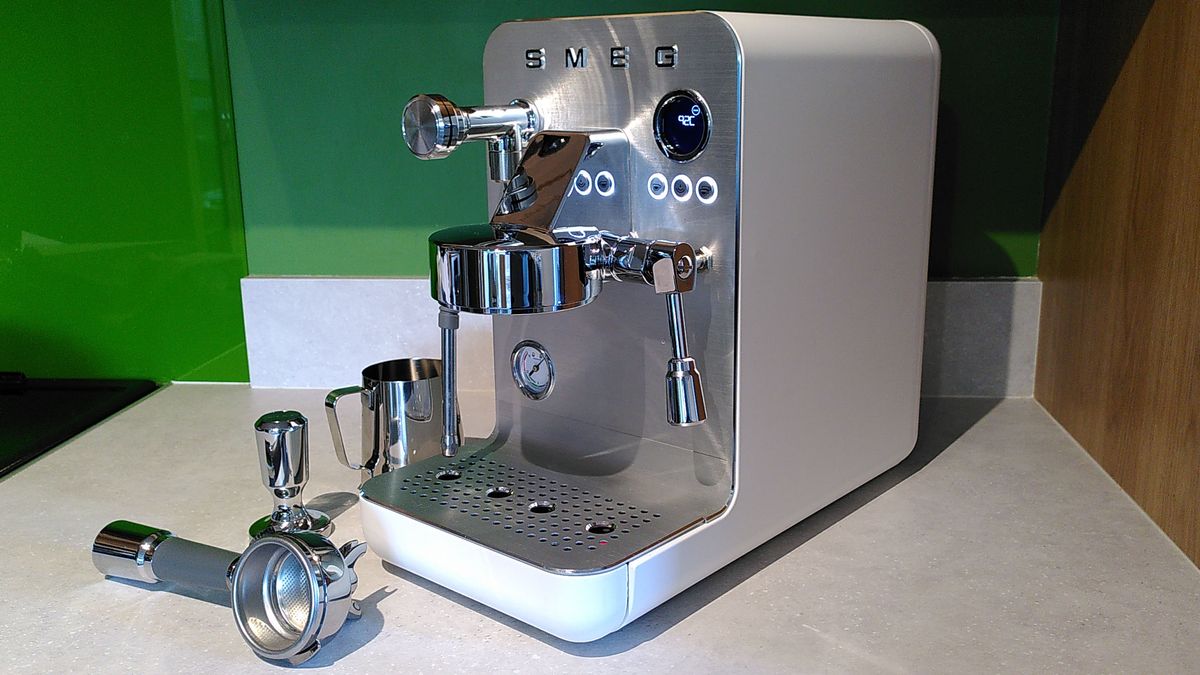Smeg Mini Pro Espresso Coffee Machine: two-minute review
The Smeg Mini Pro Espresso Coffee Machine is a manual coffee maker that gives you a taste of the barista experience, giving you the option of pulling an espresso shot with a pleasingly smooth and tactile lever, or simply twisting the filter handle into place and pressing a button to let the machine do the work for you.
After trying the Smeg Mini Pro last year, one of my colleagues at TechRadar concluded that although lovely, it was “probably overkill for me and most coffee drinkers” – but having used it for several weeks in place of my usual espresso machine, I’m inclined to disagree. Although it has the looks of a professional coffee maker, it’s not only one of the best espresso machines I’ve used when it comes to brewing consistently good coffee, it’s also one of the easiest to use, and makes achieving a good shot refreshingly simple.
It’s a relatively compact (small enough not to dominate a tiny kitchen) and thoughtfully designed, with features including a bright LED display, a pressure gauge that gives you an indication of how well extracted your espresso is likely to be, and customizable temperature and volume settings – the latter of which are very handy if you’ll be using the single and double shot presets regularly.
However, although it’s not overkill in terms of features, the Smeg Mini Pro Espresso Coffee Machine is certainly expensive. I’d expect to pay a premium for one of the best bean-to-cup coffee machines, but it’s rare to see a manual consumer espresso machine at this price point. This is approaching the price of a commercial machine (with pressure profiling and flow control, which the Mini Pro lacks), so you’ll have to really fall in love with it to justify the cost.
If you like the idea of a lever coffee machine and don’t have that much cash to spend, it’s worth taking a look at the range of fully manual machines from La Pavoni (a company now owned by Smeg), which includes several more affordable models.
Smeg Mini Pro Espresso Coffee Machine: Specs
| Name | Smeg Mini Pro Espresso Coffee Machine |
| Type | Manual |
| Dimensions (HxWxD) | 14.2 x 8.7 x 17in / 360 x 220 x 433mm |
| Weight | 35.7lb / 16.2kg |
| Pump pressure | 15 bar |
| Water tank capacity | 57.5oz / 1.7l |
Smeg Mini Pro Espresso Coffee Machine: price and availability
- Launched in the UK in June 2024
- List price £1,399.95 (about $1,700 / AU$2,800)
- Not yet available to buy elsewhere
The Smeg Mini Pro Espresso Machine launched in the UK in June 2024, priced at £1,399.95 (about $1,700 / AU$2,800). At the time of writing (January 2025) it’s not yet available in other territories.
That’s a serious price tag for a home espresso machine, and much pricier than even premium bean-to-cup coffee makers like the Breville Barista Touch Impress.
Smeg Mini Pro Espresso Coffee Machine: Design
- Sleek 1960s-inspired aesthetic
- Choice of lever or button controls
- No flow control or pressure profiling
The Smeg Mini Pro is a lovely looking coffee maker, with the same brushed metal and smooth curves as the fully automatic BCC13 bean-to-cup espresso machine I reviewed last year. It comes in a choice of three colors: white (shown here), black, or emerald green.
It’s also relatively compact, measuring 14.2 x 8.7 x 17in / 360 x 220 x 433mm. This meant it didn’t look out of place in my small kitchen, and fitted easily underneath my wall cabinets.
Although it might look a little intimidating if you’re used to more basic machines, the Mini Pro is refreshingly simple to use. Reach behind the machine and you’ll find a power button on the left-hand side, which turns it on with a reassuring click. Once that’s done, the machine will begin to heat. It’s set to 92C as standard, which in my experience gave good results, but you can delve into the settings to change it if you prefer something higher or lower.
A round LED display at the top right shows key information, such as whether the water is up to temperature, time elapsed if you’re using the machine to pull a shot of espresso in manual mode, maintenance status, and the various customizable options. It’s bright, and although simple, the icons in the interface are unambiguous.
There’s also a pressure gauge at the bottom left of the machine’s face, which gives you an idea of how well extracted your finished shot is going to be. It’s a shame that there’s no flow control or pressure profiling though, particularly for a machine at this price.
The Mini Pro is supplied with four filter baskets: two pressurized ones, which Smeg says are best for experimenting with grinding, dosing, and tamping, and two non-pressurized ones that are best when some of those factors are out of your control (if you’re using ready-ground coffee, for example). Which one you should choose depends on whether you’re brewing one or two cups.
You also get a blank filter to be used when cleaning the water tank – not something I’ve seen included with many espresso machines – plus a brush and two different sized needles. One of these is for cleaning the steam wand, and the other is for the holes of the filters.
The 1L water tank is located at the back, and has a sturdy handle that makes it easy to remove. There’s no water filter supplied, but if you have hard water (identified using the testing strip included with the coffee machine) you can buy them separately and simply screw one into the bottom of the tank. When the tank needs refilling, you’ll be notified by an icon on the display.
There’s a cup-heater on top, which has a bumpy surface that keeps your stoneware from slipping off, and the drip tray is easy to slide out and empty without spillage. My only criticism of the design (and it’s a very minor one) is that there’s nothing really securing the cover that sits over the water tank, so you could knock it off when you’re pulling the machine forward to access it.
Most of the components (including the filters and filter holder) can be cleaned by rinsing in water. You can use mild dish soap to clean the drip tray if necessary, but avoid anything abrasive on any part of the machine.
You’ll receive an alert when it’s time to descale the Mini Pro. The pros at Smeg use Oust brand descaler, but when I checked, they told me any food-safe liquid descaler would be fine. They also provided a video demonstrating how to descale the machine.
Smeg Mini Pro Espresso Coffee Machine: performance
- Produces consistently well extracted coffee
- Fast heating and quiet pump
- Lacks pressure profiling and flow control
The machine heats fast, with separate thermoblocks for coffee and steam, plus an independently heated group head to keep a consistent temperature while your coffee is extracted. During my tests it reached the target temperature of 92C within a minute, and was ready to brew shortly afterwards (the LED display will show when it’s ready to go).
I really appreciated having a choice of ways to brew an espresso – either by tapping one of the buttons to pull a single or double shot, or by pulling the lever up manually so you can keep an eye on the volume of coffee and the timer yourself.
The action of the lever is smooth and satisfying, but it’s very nice having the choice of the two customizable buttons if you don’t want to spend time measuring out a shot yourself. The single and double shot presets are easy to customize; just press and hold either button to configure it.
The pressure gauge gave a good idea of whether the my coffee was likely to be under- or over-extracted, helping me avoid wasting milk on a poor quality espresso. Although the Mini Pro can achieve 15 bars of pressure, it’s optimized for 9-10 bars, which is generally considered ideal for brewing espresso.
During my tests, the machine brewed consistently excellent shots using both the manual lever and the presets. The only disappointing shot I had came when the water tank was starting to run low, but not low enough to generate a refill alert. The Mini Pro brewed a shot, but the gauge showed that it hadn’t generated enough pressure, and the resulting coffee tasted dry and under-extracted. It was very useful to have an early warning that it was a bad shot before I added milk, so I could refill the tank and try again.
I was also surprised just how quiet the Smeg Mini Pro was in use, with the pump reaching only 33dB while pulling a shot – similar to the murmuring of a quiet library.
The steam wand is excellent, and is the thing I’ll miss most now that I’ve finished testing the Smeg Mini Pro. Its dial allows you to increase the pressure smoothly so you don’t end up with milk sprayed onto your kitchen counters (something that sometimes happens with my Gaggia Classic). The large capacity of the water tank means you can also keep steaming for much longer than you can with the little Gaggia, giving you plenty of time to achieve your preferred milk texture and temperature. The dial is large and tactile, with a super smooth motion as you adjust the intensity of the steam.
Smeg hasn’t skimped with the accessories either. The 2.3in / 58mm diameter tamper is nicely weighted, and even the dishwasher-safe milk pitcher is excellent. with a shape that makes it easy to achieve a good whirlpool.
Overall, making coffee with the Smeg Mini Pro Espresso Machine is a real pleasure. I’d just expect a little more customization from a product costing almost as much as a commercial model.
Should you buy the Smeg Mini Pro Espresso Coffee Machine?
| Aspect | Notes | Score |
|---|---|---|
| Value | This is an excellent espresso machine with a stunning 60s-inspired look, but you’re paying a big premium for the Smeg brand name and aesthetic. | 3 / 5 |
| Design | I can’t fault this machine’s looks, and its thoughtfully designed interface means it’s a pleasure to use every day. | 5 / 5 |
| Performance | The Smeg Mini Pro does its job extremely well, but at this price I might expect some extra pro-grade features like pressure profiling and flow control. | 4.5 / 5 |
Buy it if
Don’t buy it if
Smeg Mini Pro Espresso Coffee Machine: also consider
Not sure about the Smeg Mini Pro Espresso Machine? Here are two other options to consider
How I tested the Smeg Mini Pro Espresso Coffee Machine
I used the Smeg Mini Pro Espresso Machine instead of my usual Gaggia Classic for four weeks, typically using it two or three times a day. I usually brewed standard 60ml double-shot espressos at 92C.
I used fresh coffee beans from Clifton Coffee Roasters, ground using a Dualit burr grinder, and filtered tap water. I tested the steam wand using chilled whole dairy milk and oat milk.
For more details, take a look at how we test, review, and rate at TechRadar.
First reviewed January 2025
Read the full article here














